Scyphozoa - Study guides, Class notes & Summaries
Looking for the best study guides, study notes and summaries about Scyphozoa? On this page you'll find 23 study documents about Scyphozoa.
All 23 results
Sort by
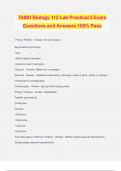
-
TAMU Biology 112 Lab Practical 2 Exam Questions and Answers 100% Pass
- Exam (elaborations) • 23 pages • 2024
- Available in package deal
-
- $12.49
- + learn more
TAMU Biology 112 Lab Practical 2 Exam Questions and Answers 100% Pass Phylum Porifera - Answer- No true tissues Asymmetrical symmetry Taxa: -Silicea (glass sponges) -Calcarea (rest of sponges) Osculum - Answer- Water exit in sponges Spicules - Answer- -Skeletal components of sponges made of silica, calcite or spongin -Produced by amoebocytes Choanocytes - Answer- Spong's filter-feeding cells Phylum Cnidaria - Answer- Diploblastic Radially symmetrical Cnidocytes Classes: -Anthozoa...
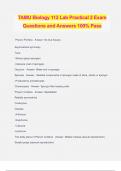
-
TAMU Biology 112 Lab Practical 2 Exam Questions and Answers 100% Pass
- Exam (elaborations) • 23 pages • 2024
- Available in package deal
-
- $13.49
- + learn more
TAMU Biology 112 Lab Practical 2 Exam Questions and Answers 100% Pass Phylum Porifera - Answer- No true tissues Asymmetrical symmetry Taxa: -Silicea (glass sponges) -Calcarea (rest of sponges) Osculum - Answer- Water exit in sponges Spicules - Answer- -Skeletal components of sponges made of silica, calcite or spongin -Produced by amoebocytes Choanocytes - Answer- Spong's filter-feeding cells Phylum Cnidaria - Answer- Diploblastic Radially symmetrical Cnidocytes Classes: -Anthozoa...
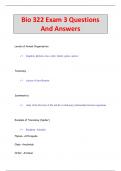
-
Bio 322 Exam 3 Questions And Answers
- Exam (elaborations) • 39 pages • 2024
- Available in package deal
-
- $12.99
- + learn more
Hirudin is similar to _______ ~ heparin (used medically) Hirudo medicinalis ~ medicinal leech True or False: All leeches are brown in color. ~ False. Some are brightly colored. bladder worm ~ larval stage of class cestoda (tapeworm) mesenchyme ~ connective tissue of acoelomates (flatworms) Phylum Platyhelminthes Classes (3) ~ Class Turbellaria (flatworms) Class Trematoda (flukes) Class Cestoda (tape worms, parasites) Phylum Cnidaria Classes (3) ~ Class Hydrozoa (hydr...
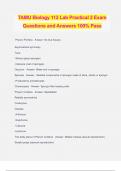
-
TAMU Biology 112 Lab Practical 2 Exam Questions and Answers 100% Pass
- Exam (elaborations) • 23 pages • 2024
-
- $12.49
- + learn more
TAMU Biology 112 Lab Practical 2 Exam Questions and Answers 100% Pass Phylum Porifera - Answer- No true tissues Asymmetrical symmetry Taxa: -Silicea (glass sponges) -Calcarea (rest of sponges) Osculum - Answer- Water exit in sponges Spicules - Answer- -Skeletal components of sponges made of silica, calcite or spongin -Produced by amoebocytes Choanocytes - Answer- Spong's filter-feeding cells Phylum Cnidaria - Answer- Diploblastic Radially symmetrical Cnidocytes Classes: -Anthozoa...
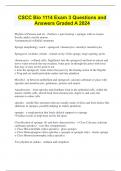
-
CSCC Bio 1114 Exam 3 Questions and Answers Graded A 2024
- Exam (elaborations) • 10 pages • 2024
-
- $14.49
- + learn more
Phylum of Parazoa and etc - Porifera = pore bearing = sponges with no tissues Sessile adults, mostly marine Asymmetrical or Radial symmetry Sponge morphology voacb - spongocel, choanocytes, mesohyl, amoebocytes Spongocel, osculum, ostium - central cavity of the sponge, large opening, pores choanocytes - collared cells; flagellated, line the spongocel and beat in unison and move water towards the top osculum; water goes in through the pores with food that may or may not be good to eat ...
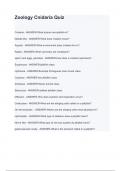
-
Zoology Cnidaria Quiz with correct answers
- Exam (elaborations) • 1 pages • 2024
-
- $7.99
- + learn more
Cnidaria - ANSWER-What phylum are jellyfish in? Needle-like - ANSWER-What does cnidaria mean? Aquatic - ANSWER-What environment does cnidaria live in? Radial - ANSWER-What symmetry are cnidarians? sperm and eggs, gametes - ANSWER-How does a cnidaria reproduce? Scyphozoa - ANSWER-jellyfish class Hydrozoa - ANSWER-Example Portuguese man-of-war class Cubozoa - ANSWER-box jellyfish class Anthezoa - ANSWER-flower animal class Staurozoa - ANSWER-stalked jellyfish class Diffusion - ANSWER-How...
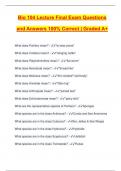
-
Bio 104 Lecture Final Exam Questions and Answers 100% Correct | Graded A+
- Exam (elaborations) • 16 pages • 2024
-
- $9.49
- + learn more
Bio 104 Lecture Final Exam Questions and Answers 100% Correct | Graded A+ What does Porifera mean? - "to bear pores" What does Cnidaria mean? - "stinging nettle" What does Platyhelminthes mean? - "flat worm" What does Nematoda mean? - "thread like" What does Mollusca mean? - "thin shelled"/"soft body" What does Annelida mean? - "little ring" What does Arthropoda mean? - "jointed feet" What does Echinodermata mean? - "spiny skin" What are the representative species of ...
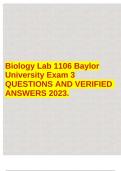
-
Biology Lab 1106 Baylor University Exam 3 QUESTIONS AND VERIFIED ANSWERS 2023.
- Exam (elaborations) • 4 pages • 2023
-
- $6.49
- + learn more
Biology Lab 1106 Baylor University Exam 3 QUESTIONS AND VERIFIED ANSWERS 2023. 1. Phylum Porifera (sponges): asymmetrical lack true tissues have unique cells called CHOANOCYTES (flagellated cells that will draw in water and filter food particles) Genus: Grantia, Spongia, Euplectella 2. Phylum Porifera Genus Grantia: isolated spicules walls of sponges contain amoebocytes and crystallized structures called spicules incurrent canals and flagellated canals 3. Phylum Porifera Genus Spon...

-
Campbell Biology Chapter 33 Study Guide with Complete Solutions
- Exam (elaborations) • 13 pages • 2024
-
- $9.99
- + learn more
Campbell Biology Chapter 33 Study Guide with Complete Solutions Invertebrates - Answer️️ -Animals without a backbone. About 95% of known animal species. Calcarea and Silicea - Answer️️ -phylum that includes sponges; no symmetry, tissues, body cavity, organs, nervous system; basal animals; mostly marine; contain spicules; most are hermaphrodites; free-swimming during larval stage and sessile (non motile) as adults; suspension/filter feeders Suspention feeders - Answer️️ -small...
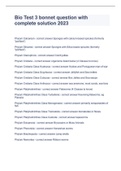
-
Bio Test 3 bonnet question with complete solution 2023
- Exam (elaborations) • 6 pages • 2023
-
Available in package deal
-
- $9.99
- + learn more
Bio Test 3 bonnet question with complete solution 2023Phylum Calcarean - correct answer Sponges with calcium-based spicules (formerly "porifera") Phylum Silicarea - correct answer Sponges with Silica bases spicules (formerly "porifera") Phylum Ctenophora - correct answer Comb jellies Phylum Cnidaria - correct answer organisms listed below (4 Classes to know) Phylum Cnidaria Class Hydrozoa - correct answer Hydras and Portuguese man-of-war Phylum Cnidaria Class Scyphozoa - corre...

Did you know that on average a seller on Stuvia earns $82 per month selling study resources? Hmm, hint, hint. Discover all about earning on Stuvia


